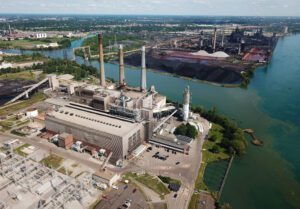Planet Detroit: How one of Detroit’s biggest polluters gets a massive tax break… for ‘not polluting’

Federal and state environmental regulations require companies to abate and dispose of harmful air and water pollutants their operations produce.
That means installing specialized, often quite expensive, equipment. But in Michigan, and many states, companies then receive massive tax breaks on these investments.
That’s what Good Jobs First researcher Jacob Whiton uncovered as he was collecting Subsidy Tracker data on economic development subsidies given to companies in Michigan. He found that over the past 50 years, companies have used the state’s pollution control exemption to shield over $17 billion in taxable property from state and local taxes.
That means some of Michigan’s richest, biggest, most powerful companies have saved billions of dollars in property and sales taxes that would have otherwise have gone to schools, parks, healthcare, workforce training, affordable child care, and numerous other public services our tax dollars support.
For Planet Detroit, Whiton wrote about one of the program’s biggest beneficiaries:
“A costly Michigan tax break intended to reduce air pollution has been a boon for one of Detroit’s biggest polluters: Marathon Petroleum.
Over the last decade, Marathon has entered into three different consent orders with the Michigan Department of Environment, Great Lakes, and Energy (EGLE) for violating state air pollution control regulations at its refinery in southwest Detroit. The company exceeded permitted emissions limits on fine particulate matter, carbon monoxide, and hydrogen sulfide, endangering working-class Black and Hispanic families living nearby and contributing to Detroit’s dubious distinction as the asthma capital of the United States.
For its violations, the company was required to pay penalties totaling $243,353 and to spend an additional $282,000 on supplemental environmental projects in neighboring communities. Marathon ultimately spent $539,000 on a new air filtration system at Mark Twain School for Scholars, a nearby public elementary and middle school, and ongoing air quality monitoring to comply with the latter requirement.
All the while, unbeknownst to the general public, Marathon was saving many times those penalties every year on its sales and property taxes via the state’s Air Pollution Control Exemption program. This program is written into the state’s main environmental protection law. It allows companies to avoid paying any taxes on real and personal property acquired to mitigate air pollution, revenue that would have otherwise gone to fund city and county services and public education.”
Read the full piece at Planet Detroit.